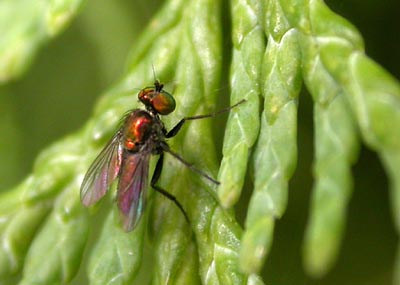Diptera.info :: Identification queries :: Diptera (adults)
|
[Chrysotus sp] Dolichopodidae ID
|
|
| Arthropa |
Posted on 14-08-2004 22:42
|
|
Member Location: Fragnes (Burgundy, France) Posts: 183 Joined: 15.06.04 |
Once more needing some help for some ID ! This one is 2 mm long. (Brittany, France - 12th July 2004)   Thanks ! Edited by Arthropa on 09-03-2007 23:32 Benoit MARTHA  |
| Paul Beuk |
Posted on 16-08-2004 08:16
|
|
Super Administrator Location: Netherlands Posts: 19403 Joined: 11.05.04 |
Bonjour Benoit, You have chosen a very difficult one. It is a species belonging to the genus Chrysotus and the taxonomists are still not decided what the proper species are. This species reminds me of C. kowarzi, but the details in the picture are no not clear enough to make certain that it is this species. Possible characters in the genitalia are necessary for a certain identification. I hope Chrysotus will do for the moment. Paul - - - - Paul Beuk on https://diptera.info |
| Arthropa |
Posted on 16-08-2004 08:55
|
|
Member Location: Fragnes (Burgundy, France) Posts: 183 Joined: 15.06.04 |
Thanks. "Chrysotus sp" is quite enough for me, since photos are just my hobby, not my job !  Visitors on my website don't seek for "professionnal" information !  When I can insert species name with my pictures on my website, it's the best, of course. But when I know the genus or sometime even just the family, it's already very nice, all the more with diptera that seem very difficult to me ! Best greetings Edited by Arthropa on 16-08-2004 08:56 Benoit MARTHA  |
| Marc Pollet |
Posted on 13-09-2009 13:58
|
|
Member Location: Welle (Denderleeuw) Posts: 161 Joined: 02.06.05 |
Dear Benoit, I do not agree with Paul that this specimen of yours is reminescent of C. kowarzi which has an enlarged postpedicel (3rd antennal segment) and nearly entirely dark legs. I do agree with Paul on the fact that you better stick to the genus Chrysotus for the moment until you are able to examine the specimen. My guess would be that it belongs to the C. gramineus species group, incorporating species like C. angulicornis and C. varians. Far the best thing to do is to collect the specimens effectively after having them photographed. Cheers, Marc dr Marc Pollet (marc.pollet@inbo.be) |
|
|
|
| Jump to Forum: |













